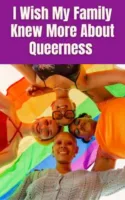I wish my family knew more about queerness when I was growing up.
As a queer person, being seen goes two ways. A person may see you and find you disgusting and, through whatever means, will do everything in their power not to see you. It is sad and dangerous the lengths people go to to achieve this.
Another is when someone sees you and it feels like they are seeing themselves, or the person they could be. This is the kind of visibility that matters to me. It is why I write and continue to read works written by LGBTQ+ people. It feeds me and in turn, feeds many I come across.
When I was younger, I lived in constant anxiety about myself and questioned what people thought of me when they looked at me. I worried about things no child should worry about at that age. Why does this world continue to make people who aren’t straight feel like they are abnormal and something about them needs fixing? That question terrorised me, and it is sad to see that even now many young people still suffer because of it. Existing the way we do is revolutionary simply because we’re often told not to.
Just yesterday I was involved in a heated online debate where people were saying children are being coerced into being gay. If a child who was questioning their identity went through that thread, they would have spent the entire day in the dark hating themselves because someone online said they are confused. I know that ten-year-old Riley would have.
It was a triggering experience defending my own lived experiences by explaining that children know from a very young age who and what they are. If this wasn’t the case, then we would all identify as gender-neutral until a certain point in our lives when we realise that we are either straight or not. That should be the argument, right? But I was not writing this to convince a group of trolls who had already made up their minds what the queer experience entails, but to impart something to a scared person who feels like they are alone, so they may know that someone sees them and is rooting for them. I wish my family did this for me while I was growing up.
The day I discovered George M. Johnson’s memoir, All Boys Aren’t Blue, three years ago, my life underwent a drastic turn. I had been reading books by LGBTQ+ people compulsively and watching movies and TV shows with these storylines. I was looking for anything I could get my hands on that had gay people in it. These things gave me a way out at a time when I needed one. I didn’t fully understand what I was doing or why I was doing it until I began reading the book. I was looking for myself, and in the pages of their life story, I found so much more.
Visibility and representation are important for many reasons, but the one I appreciate the most is how they give you a language to describe what you are feeling and are going through, and help you be able to explain it better. George M. Johnson’s memoir did that for me, and while there are many things I wish I had known when I was younger that would have made my life better—things like gender, sex and sexuality, and everything else that makes navigating the queer identity easier—I appreciated knowing that there was someone out there who not only looked like me but also felt what I was feeling, and they grew up to be great. It assured me that I, too, could be the same.
See, I only knew the word “queer” well into my adulthood. It is an umbrella term that encompasses LGBTQ+ identities. I also found out from the people I interacted with online that just because this word is an umbrella doesn’t mean everyone uses it. It is a personal decision. Many of the things we go through as queer people are personal and individual. It is why people should be given a chance and the space to decide for themselves what and who they are.
I look back on my childhood with a heavy heart because it shouldn’t be that we have to pick up a book to find ourselves. The people in our lives should open the space for us to feel safe enough to self-actualise and be free to be ourselves. I look at my life now and the work I do, and am proud because Little Me would be proud. It is also bittersweet. Your child should not have to go online and learn about these things from internet strangers. They should be learning them from and with you.
***
Tell us: how do you think parents can help children feel comfortable with their sexuality?
Read here about how girls can like girls



